You can protect your onions from harmful pests by planting aromatic companions like chives, garlic, marigolds, and herbs such as rosemary, thyme, and sage around your onion beds. These plants release natural compounds that repel aphids, thrips, onion flies, and nematodes while attracting beneficial insects like ladybugs and hoverflies for added protection. Chamomile and oregano also enhance onion growth while deterring mosquitoes and cabbage worms. Strategic placement of these companion plants creates a thorough natural defense system for your crops.
Why Companion Planting Protects Onions From Common Garden Pests
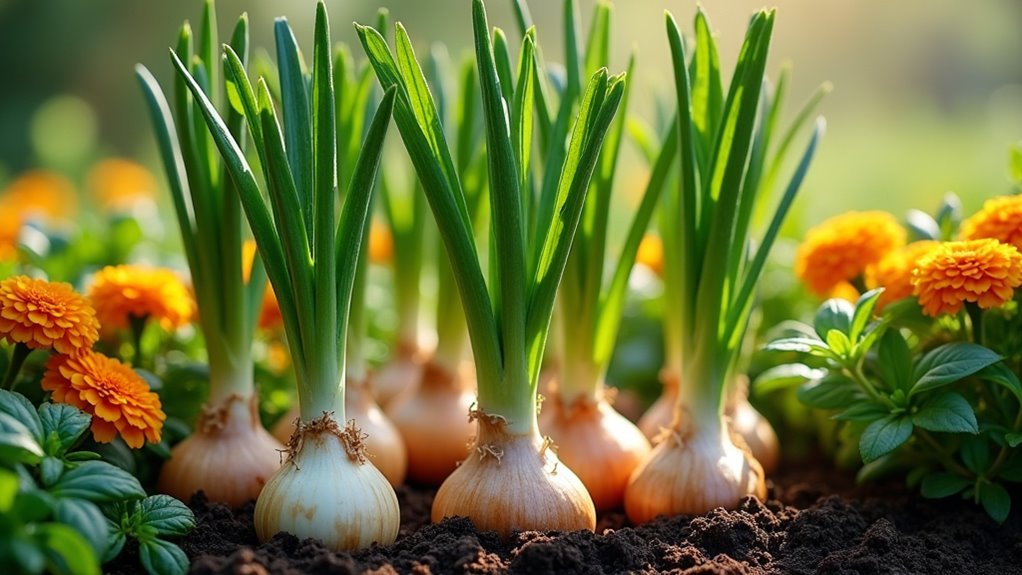
When you plant specific companion plants near your onions, you’re creating a natural defense system that repels harmful insects through powerful scents and targeted pest control.
Strategic companion planting transforms your garden into a living fortress, where aromatic allies work tirelessly to shield your onions from destructive pests.
Companion planting works by utilizing aromatic herbs and flowers that emit strong scent compounds, confusing and deterring pests like nematodes, onion flies, and aphids.
Plants such as marigolds, rosemary, and thyme create protective barriers around your onion plants through their intense aromas.
This strategic approach also attracts beneficial insects like wasps and hoverflies that naturally prey on harmful pests, providing extensive pest management.
Chives: Natural Onion Fly and Aphid Deterrent
Since chives belong to the same Allium family as onions, they’ll naturally repel onion flies and aphids through their potent sulfur compounds and aromatic oils.
You’ll find chives create an effective natural barrier around your onion crops, confusing these destructive pests with their strong scent.
Plant chives directly beside your onions for ideal pest control benefits. They thrive in identical growing conditions—full sun and well-draining soil—making them perfect garden companions.
When chives bloom, they’ll attract beneficial insects like pollinators and predatory wasps that further protect your onions.
You’ll also discover that chives enhance your onions’ flavor while providing dual-purpose harvests.
This simple companion planting strategy gives you natural pest management without chemicals, creating a healthier garden ecosystem that protects your valuable onion crops year-round.
Garlic: Powerful Pest Repellent for Onion Gardens
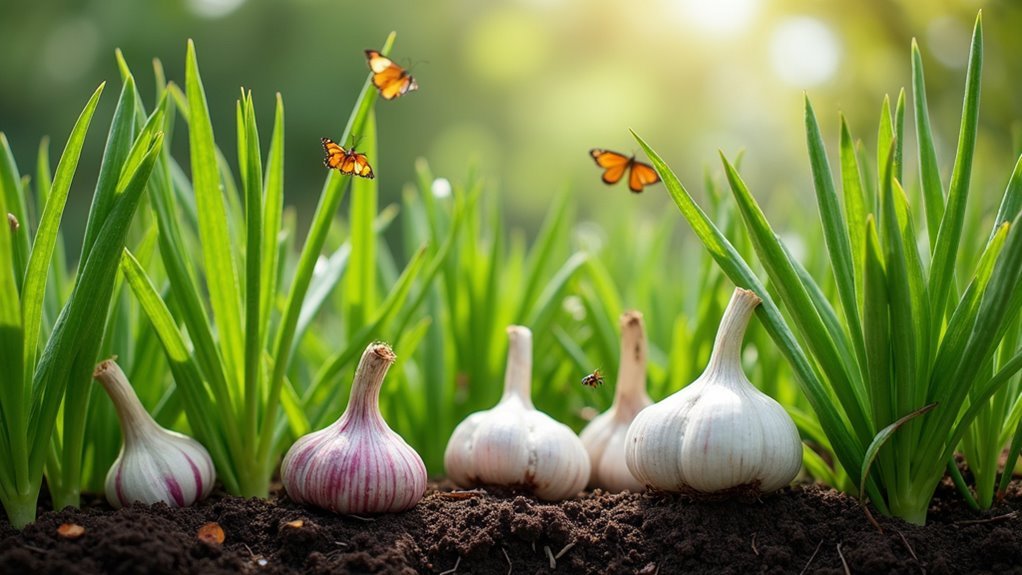
You’ll find garlic’s natural compounds, particularly allicin, create a powerful shield against onion flies, aphids, and other garden pests through their potent odor.
This member of the Allium family works exceptionally well as a companion plant since it shares onions’ preference for well-draining soil and full sunlight.
When you interplant garlic directly among your onion rows, you’ll maximize both space efficiency and pest protection while gaining a valuable culinary harvest.
Garlic’s Natural Defense Properties
Although garlic and onions share the same botanical family, garlic’s potent sulfur compounds make it an exceptionally powerful guardian for your onion patch. This natural repellent works by emitting strong odors that disrupt pests’ sensory receptors, effectively confusing onion flies and aphids before they can damage your crops.
Garlic’s allelopathic properties go beyond simple odor deterrence. These compounds actively inhibit harmful organisms in your garden’s ecosystem while creating protective barriers around neighboring plants.
When you incorporate garlic into your companion planting strategy, you’ll notice how it deters pest infestations and simultaneously improves your onions’ flavor profile.
The defensive mechanism works continuously, making garlic an ideal low-maintenance solution that’ll enhance your garden’s overall health and potentially increase your onion yields through consistent pest protection.
Optimal Garlic Companion Placement
Three key spacing principles determine garlic’s effectiveness as your onion companion.
First, you’ll want to plant garlic within the same garden bed as your onions since both companion plants thrive in identical growing conditions—well-draining, fertile soil. This proximity maximizes garlic’s pest repellent properties by creating a protective barrier around your onions.
Second, avoid planting garlic too densely near onions. While garlic effectively deters pests like onion flies and aphids, overcrowding can create nutrient competition that stunts onion growth. Maintain adequate spacing between plants to prevent this issue.
Third, strategically position garlic throughout your onion rows rather than clustering it in one area. This distribution guarantees garlic’s strong scent masks onion odors across the entire planting area, confusing pests and reducing attraction to your crops.
Marigolds: Colorful Protection Against Thrips and Nematodes
You’ll find marigolds are exceptional companions for your onion beds, as their potent scent creates a natural barrier against destructive thrips and soil-dwelling nematodes.
These cheerful flowers don’t just repel harmful pests—they actively attract beneficial insects like ladybugs and hoverflies that’ll hunt down any remaining threats to your crop.
When you plant marigolds strategically around your onions, you’re establishing a dual defense system that protects from both above-ground and below-ground attacks.
Thrips and Nematode Defense
When thrips and nematodes threaten your onion crop, marigolds offer a vibrant and effective defense strategy. These colorful companion plants release powerful compounds, particularly limonene, that actively deter harmful pests from your garden.
You’ll find that marigolds’ strong scent creates an unwelcoming environment for thrips and nematodes, markedly reducing their populations around your onions.
The natural pest control benefits extend beyond simple deterrence. Marigolds actually enhance your onion growth by attracting beneficial insects that further support garden health.
You can easily integrate these hardy flowers into your onion beds since they share similar growing requirements – both thrive in full sun and well-draining soil.
This strategic companion planting approach leads to improved yields while maintaining a naturally balanced ecosystem that keeps destructive pests at bay.
Beneficial Insect Attraction
Beyond their pest-deterrent properties, marigolds transform your onion garden into a thriving hub for beneficial insects that actively combat harmful pests.
These vibrant flowers attract pollinators like ladybugs and hoverflies, creating a natural defense system that’ll reduce pest infestations throughout your growing area. When you plant marigolds strategically around your onions, you’re fundamentally recruiting an army of helpful predators that hunt down thrips, aphids, and other destructive insects.
This symbiotic relationship greatly enhances growth conditions for your onion crops while building robust garden biodiversity.
The beneficial insects drawn to marigold blooms don’t just serve as deterrent pests—they actively patrol your garden, creating a balanced ecosystem where your onions can flourish with minimal intervention from you.
Chamomile: Enhancing Onion Health While Deterring Insects
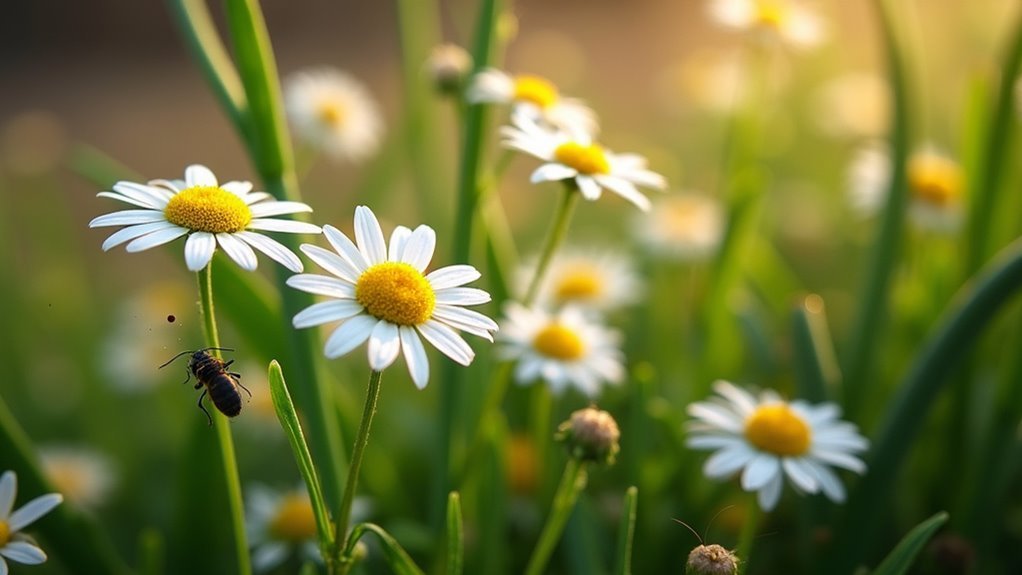
Although chamomile’s delicate white flowers might seem purely ornamental, this aromatic herb serves as a powerful ally in protecting your onion crops from destructive pests. Chamomile’s strong scent naturally repels aphids, flies, and mosquitoes while attracting beneficial hoverflies that control harmful pest populations.
| Benefit | Effect | Result |
|---|---|---|
| Pest Deterrent | Repels aphids, flies, mosquitoes | Reduced crop damage |
| Beneficial Insects | Attracts hoverflies | Natural pest control |
| Growth Enhancement | Improves flavor and development | Healthier harvest |
When you plant chamomile near your onions, you’ll enhance their growth and flavor while creating a diverse ecosystem. This companion thrives in well-draining soil and full sun, making it perfectly suited to deter pests alongside your onions while improving overall garden productivity and aesthetics.
Oregano: Aromatic Defense Against Cabbage Worms and Mosquitoes
Oregano’s pungent aroma creates an invisible barrier that effectively drives away cabbage worms and mosquitoes from your onion garden.
Oregano’s natural oils form a protective shield around onions, deterring destructive pests through its powerful aromatic compounds.
This aromatic herb makes an excellent companion plant choice, offering dual benefits of pest control and culinary value.
The herb’s natural oils contain compounds that disrupt pest sensory receptors, making your onions less detectable to harmful insects.
You’ll find oregano particularly effective against cabbage worms that can damage your crop.
- Attracts beneficial insects like bees and butterflies for improved pollination
- Thrives in similar conditions as onions with well-draining soil and full sun
- Provides culinary harvest while protecting your garden from pests
- Creates long-term protection as a perennial that returns yearly
You can effectively repel multiple pest species while enhancing your garden’s productivity.
Parsley: Attracting Beneficial Insects to Control Onion Pests
While oregano creates a protective barrier through scent, parsley takes a different approach by transforming your onion garden into a haven for beneficial insects.
You’ll attract ladybugs and hoverflies that naturally hunt down aphids and thrips threatening your onions. This biennial herb thrives in various garden conditions, making it perfect for companion planting alongside your onions.
Parsley’s attracting power increases biodiversity while drawing pollinators that boost overall garden health. You can grow it in full sun to partial shade with well-draining soil, matching your onions’ cultivation requirements perfectly.
Beyond pest control, parsley enhances the flavor of nearby onions, giving you dual benefits. By incorporating this herb into your onion beds, you’re creating a natural defense system that works continuously.
Sage: Natural Mosquito and Fly Repellent for Onion Beds
Beyond attracting beneficial insects, sage offers a direct defensive strategy by repelling mosquitoes and flies that can stress your onion plants. This perennial herb contains powerful compounds like cineole and camphor that disrupt these pests’ sensory receptors, creating an effective natural barrier around your onion beds.
As a companion plant, sage thrives in the same conditions your onions prefer:
- Full sun exposure and well-draining soil requirements
- Natural repellent properties that reduce pest populations without chemicals
- Dual-purpose flowering that deters harmful insects while attracting pollinators
- Sustainable pest control that eliminates the need for synthetic treatments
The strong aroma continuously protects your garden while promoting biodiversity.
You’ll notice healthier onion crops with reduced pest damage when sage serves as your natural defense system.
Rosemary: Fragrant Protection From Carrot Rust Flies
You’ll find rosemary’s powerful fragrance creates an effective shield against carrot rust flies that commonly threaten your onion crops.
This aromatic herb’s natural oils act as a potent deterrent, keeping these destructive pests away from your garden beds.
When you plant rosemary strategically around your onions, you’re establishing a natural defense system that protects your harvest without harmful chemicals.
Rosemary’s Natural Repellent Properties
When you plant rosemary near your onions, you’re enlisting a powerful aromatic ally that naturally repels carrot rust flies and other problematic insects.
This fragrant herb’s strong aroma creates an effective barrier that protects your onion crops from damaging pests. As a member of the mint family, rosemary’s natural compound properties work continuously to deter various insects that threaten garden health.
The benefits of using rosemary as a companion plant include:
- Broad-spectrum pest control – repels multiple insect species beyond just carrot rust flies
- Drought-resistant growth – thrives with minimal watering and maintenance requirements
- Dual-purpose functionality – provides pest protection while offering fresh herbs for cooking
- Sunny garden compatibility – flourishes in the same bright conditions that benefit onions
This natural approach eliminates the need for chemical pesticides while enhancing your garden’s ecosystem.
Planting Rosemary Near Onions
Successful companion planting with rosemary requires strategic placement to maximize its pest-repelling benefits for your onion crops.
You’ll want to position rosemary plants within close proximity to your onions, allowing the herb’s strong aroma to create an effective barrier against pests like carrot rust flies. This aromatic companion plant works as a natural insect repellent, protecting your onions while enhancing their growth and flavor development.
Choose locations with full sunlight and well-drained soil, as these conditions benefit both crops.
Space rosemary plants evenly throughout your onion beds rather than clustering them in one area. This distribution guarantees thorough pest protection across your entire garden plot.
You’ll appreciate how this low-maintenance perennial provides year-round protection while adding valuable culinary herbs to your harvest.
Thyme: Keeping Deer and Small Pests Away From Onions
Although thyme’s reputation as a culinary herb is well-established, its pest-repelling properties make it an exceptional companion plant for your onion garden.
Thyme’s aromatic compounds naturally deter garden pests while providing fresh herbs for your kitchen, making it an ideal onion companion.
This versatile herb uses its strong aroma to repel various pests that threaten onions, including aphids and deer. Thyme’s natural deterrent qualities create an effective barrier against small insects that can damage your onion crops.
When you plant thyme near your onions, you’ll benefit from:
- Natural pest control – The herb’s scent deters aphids, deer, and other harmful insects
- Dual-purpose gardening – Harvest thyme for cooking while protecting your onions
- Living mulch benefits – Low-growing habit suppresses weeds and retains soil moisture
- Easy cultivation – Thrives in full sunlight and well-draining soil like onions
Creating an Effective Pest-Resistant Onion Garden Layout
Three key principles form the foundation of a pest-resistant onion garden: strategic companion planting, proper spacing, and smart intercropping techniques.
Position companion plants like marigolds and chamomile around onion beds to deter pests while creating natural barriers. You’ll maximize space by implementing intercropping techniques with carrots and beets, whose different root depths confuse harmful insects and reduce nutrient competition throughout the growing season.
Create physical separation using row covers or nasturtiums as trap crops to draw pests away from your onions. Guarantee adequate spacing between plants to promote air circulation, preventing humidity buildup that encourages fungal diseases.
Include basil and thyme nearby to repel insects while thriving in similar conditions. This layout design helps attract beneficial insects while maintaining a pest-resistant garden that protects your onion crop naturally.
Frequently Asked Questions
What Plants Protect Onions?
You’ll protect your onions by planting marigolds, chamomile, basil, thyme, and dill nearby. These companions repel harmful pests like aphids, nematodes, and onion flies while attracting beneficial insects that’ll enhance your crop’s health and yield.
How Do You Keep Bugs Out of Onions?
You’ll keep bugs out of onions by planting companion plants like marigolds and basil nearby, maintaining proper spacing for air circulation, and regularly monitoring plants for early signs of pest damage.
Does Planting Onions Keep Bugs Away?
Yes, you’ll find that planting onions effectively keeps bugs away. Their sulfur compounds create strong scents that naturally repel aphids, flies, and nematodes, making them excellent pest deterrents for your garden.
What Plant Repels the Most Insects?
Lavender repels the most insects due to its potent essential oils. You’ll find it deters moths, fleas, flies, mosquitoes, and ants while attracting beneficial pollinators, making it incredibly effective for natural pest control.
In Summary
You’ll find that companion planting transforms your onion garden into a natural fortress against pests. By strategically placing chives, garlic, marigolds, chamomile, sage, rosemary, and thyme around your onions, you’re creating multiple layers of protection. These aromatic allies don’t just repel harmful insects—they’ll enhance your garden’s biodiversity and boost your onions’ overall health. Start implementing this pest-resistant layout today, and you’ll enjoy healthier onions with fewer chemical interventions needed.

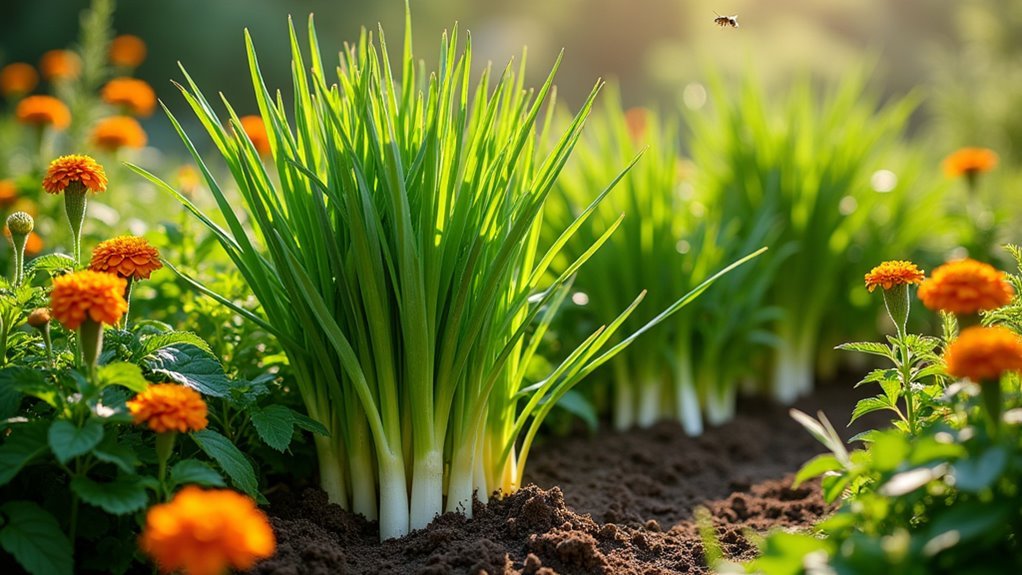
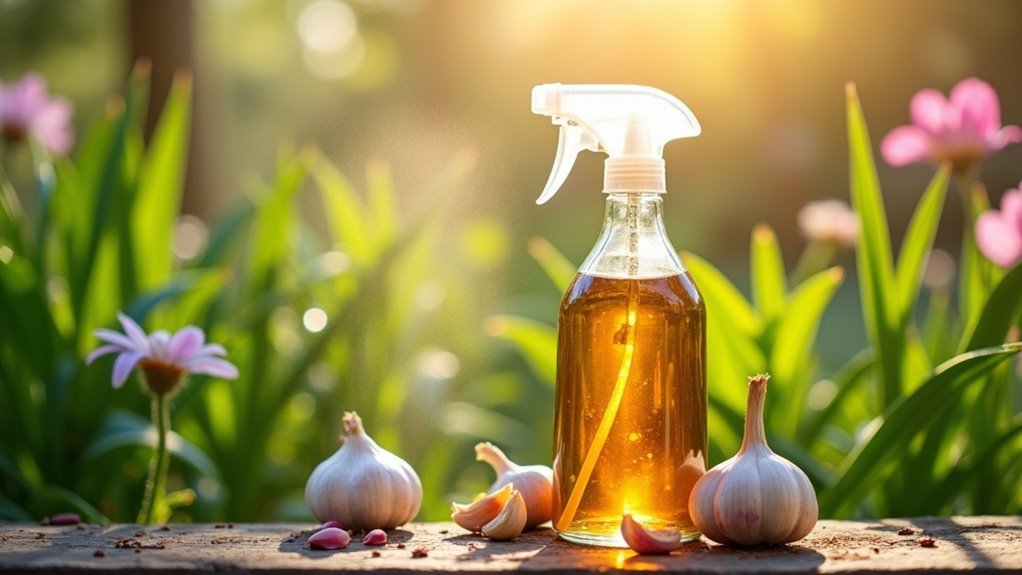
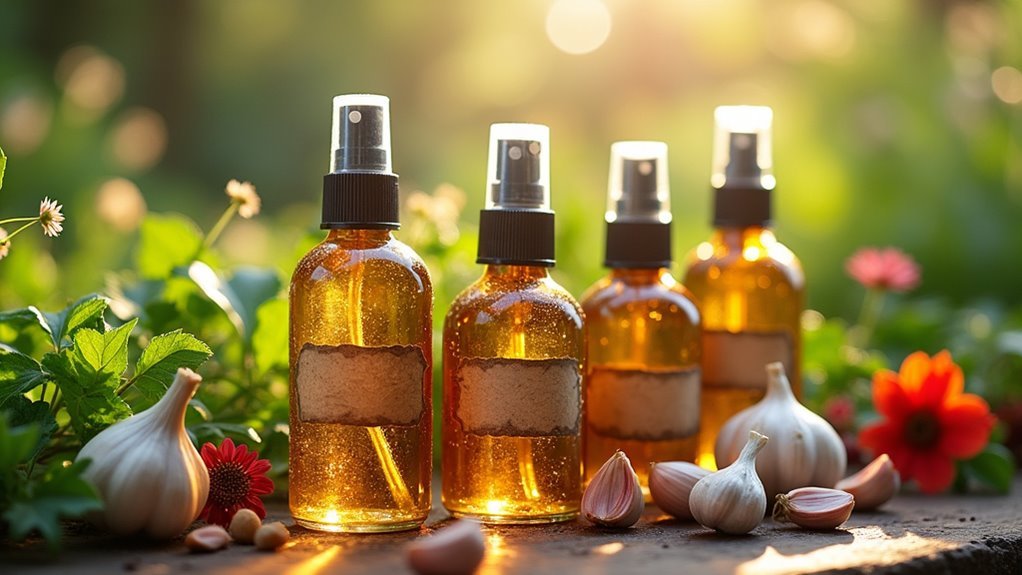
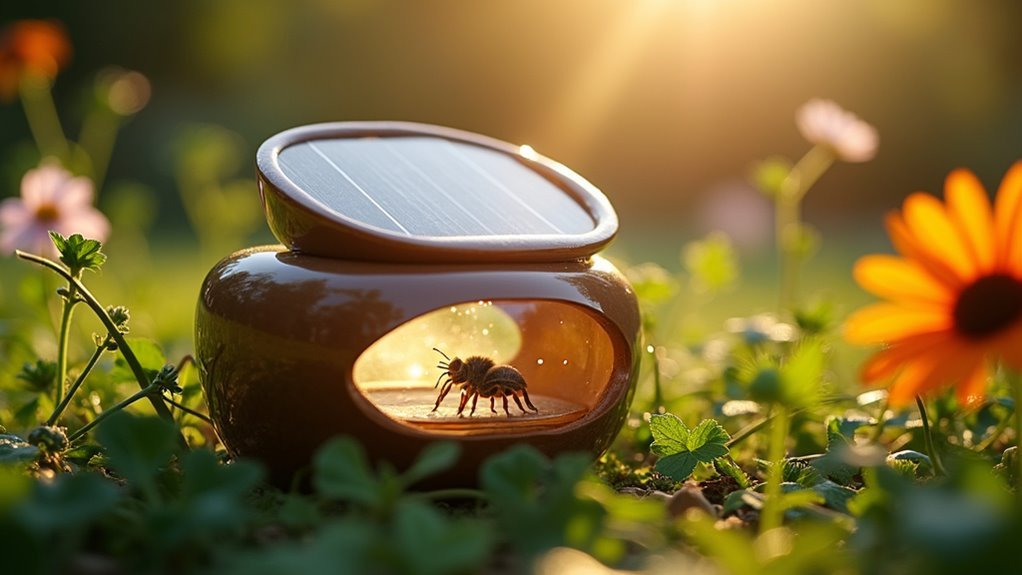
Leave a Reply